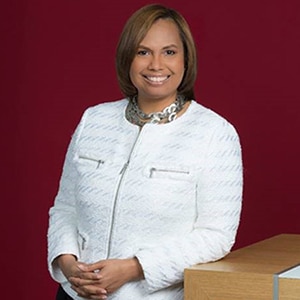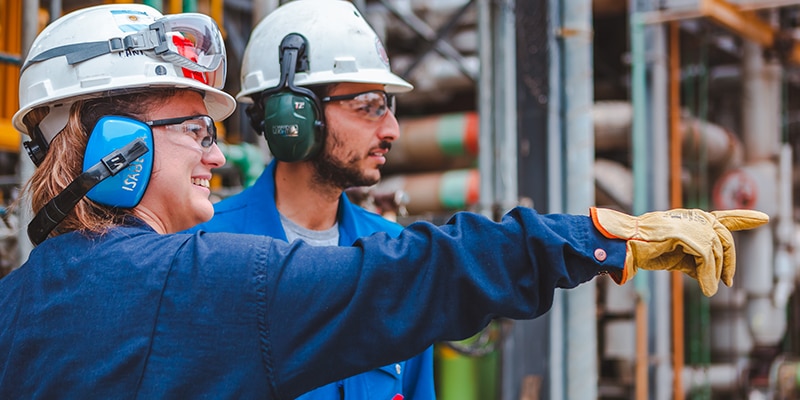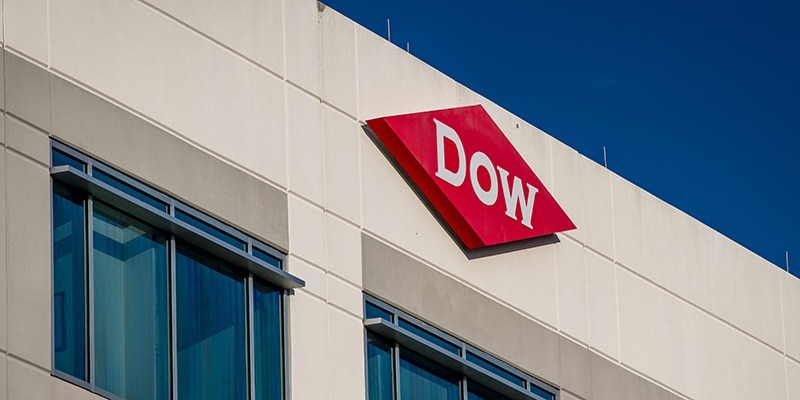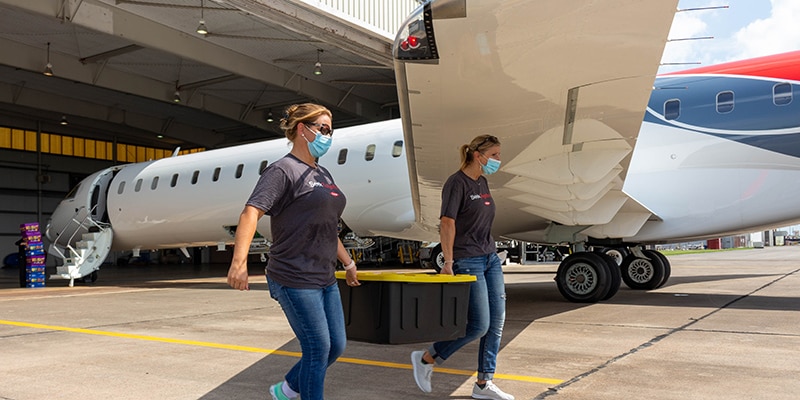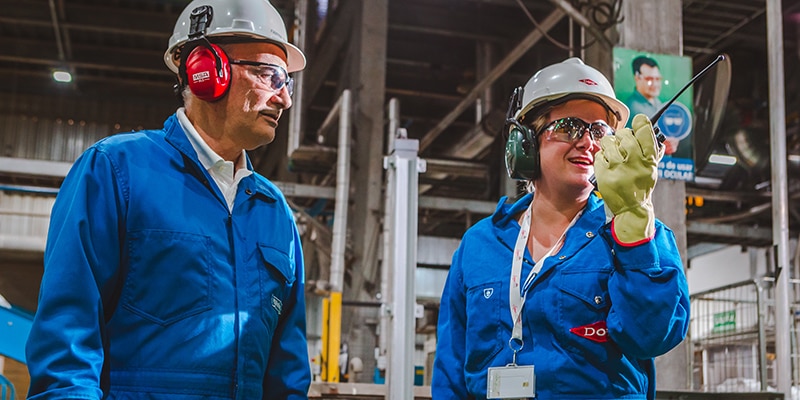Brennan Lafferty: I'm Brennan Lafferty, publisher of Plastics News. This is What Keeps You Up at Night? My guest this week, Karen Carter, Chief Human Resources Officer and Chief Inclusion Officer at Dow in Midland, Michigan. For weeks, protesters across the country and around the world have pressed for racial justice and police reform in the wake of recent deaths in the Black community, including George Floyd in Minneapolis. Some businesses have ignored the issue. Others have issued statements of support. Still others, like Dow, have embraced the moment. Dow has vowed to hire more Black employees and work hard to retain them. Dow CEO Jim Fitterling concluded a message to his employees and the public with the phrase Black Lives Matter. Carter, who is black, finds inspiration in Dow's leadership and knows there is work ahead. It's June 24th. What Keeps You Up at Night? begins now. Karen Carter joins me from Midland, Michigan, where Dow is headquartered. Hi, Karen. Thanks so much for joining me today.
Karen Carter: Thank you so much for having me. Pleasure to be here.
Brennan Lafferty: So, Karen, you've been with Dow more than 20 years. You've had some pretty impressive roles. Vice President of packaging, specialty plastics, you led a global marketing team. I don't need to tell you, but you are Chief Human Resource Officer and Chief Inclusion Officer. I'm curious, how does your previous work at Dow inform the work you're doing today?
Karen Carter: Well, thanks for that question, because, you know, people will probably be surprised to know that I was actually on the business side for the majority of my career. So I've actually been at Dow for more than 25 years. I've lived in Shanghai and had the pleasure of leading Dow's Asia Pacific team serving the construction industry. And actually, before assuming the Chief Inclusion Officer role, I led the packaging, especially plastics business in North America as the Commercial Vice President, which is how I became familiar with plastics news. And I'll tell you, you know, in all of those jobs, my focus was on helping the company prosper and thrive. And in order to do that in every business role, I always focused on people. And just a quick story about when I got the call to become the Chief Inclusion Officer. Listen, I was in my dream job. I was living in Houston. I was in the plastics business. I loved that part of the company. It's where I grew up. And our CEO at the time, Andrew Liveris, you know, he was pretty much in legacy mode and thinking about the things that we really needed to improve and diversity for sure was one of them. And so when I got the call and he asked me to be the Chief Inclusion Officer, you know, I really hesitated for a moment. Again, I've been working on and with people my entire career as a passion. And I really wondered if he was serious. But listen, I said yes. I haven't looked back. That was one of the best decisions that I made. And about a year and a half into being the Chief Inclusion Officer, I had the opportunity to expand that to Chief Human Resources Officer. And so, yeah, now I am the Chief Inclusion and Chief Human Resources Officer. And I have a seat at the table. While we are making strategic decisions for our company related to both business and to people. So I still see my role as a business leader because I'm still charged with helping the company prosper and thrive. And I can do it now through the lens of our people. And the beauty is I get to wake up and work in my passion every day.
Brennan Lafferty: Yeah. You never know where your career is going to go and sometimes opportunities arise and you step through that door and didn't realize how happy you could be. Well, let's talk diversity and inclusion. Such an important topic in today's world. Now, diversity, inclusion is a common department among major corporations like Dow, not so much at small companies, medium sized plastic suppliers, processors, because it's not such a common role or department for some of our readers and listeners. At its most basic level, why is diversity important in a workforce? Also, what is Dow doing to advance diversity and inclusion both internally and externally?
Karen Carter: You know, I really appreciate you asking the question in that way, because a lot of people do look at it as a department. But I will tell you at Dow, we look at both inclusion and diversity as a business imperative. And listen, the data is clear. The fact is that companies with more diverse workforces and inclusive cultures retain their employees longer. They grow faster and they perform better. And our own CEO, Jim Fitterling, often says that inclusion and diversity is not only the right thing to do, but it's also the smart thing to do. Just a couple of quick stats from McKinsey that a lot of people know about. More diverse companies show an 80% improvement in their business performance. Their sales revenues increased by 3-9%, and they have 48% higher earnings. And that's what is referred to as the diversity dividend. So a key indicator that at our company it is a business imperative is that it's actually incorporated into our company's ambition, which is to become the most innovative, customer-centric, inclusive and sustainable material science company in the world. So it's not an afterthought, but it's actually a catalyst that enables our business to succeed. And so the fact is, is that you can have diversity, which, of course, is a collection of unique differences. But you can't capitalize on those unique differences. In other words, get that diversity dividend without a culture and environment that embraces and values those differences. So that's what we mean by inclusion. And at Dow we're being incredibly deliberate and we're being on purpose and we are approaching this just like any other business imperative. So we have a comprehensive global strategy. We have a governance structure that starts with our CEO and cascades down and across the organization. We're committed to unbiased talent, recruitment and development. We're connecting with our communities and our partners. We're integrating this into our brand and reputation efforts, expanding and diversifying our supplier network. And we're also committed to delivering a best in class customer experience that's enabled by a best in class employee experience. Of course, customers are the very reason we exist. And let me just end with what we're doing externally. Externally, we vigorously advocate on behalf of policies and initiatives that advance inclusion and diversity, but we also measure our progress. And the way we do that is that we report on our progress externally through our Shine inclusion report that we publish on an annual basis. But we also have I&D integrated into our performance award program. And the reason we do that, is we want to demonstrate that our commitment to I&D is backed by meaningful action, but also visible results.
Brennan Lafferty: You mentioned your CEO, Jim Fitterling. He released two statements of late on race equality, injustice, one on May 30th. Second, just days ago on June 15th, he said he's committed to act on behalf of those who deal with racism, bigotry and the threat of violence because of the color of their skin. He's put money behind this. He's put resources behind these statements. I also found it interesting he made these statements acknowledging how important allies are. You said allies in the LGBTQ community, the community he is part of. Allies are important there. They're important now, when we talk about race, what did those statements of May 30th and June 15th mean to you? And what do you think they meant to the team at Dow?
Karen Carter: The recent events in the U.S. for me have been personal. Of course, I represent Dow, but I also happen to be a woman of color. I also happen to be a black woman. And to be frank, if I think about, you know, the emotion for me, I would explain them as exhausting and frustrating because these issues are just becoming far too many and far too often and far too familiar. So to have my CEO stand up and step forward and speak out and also commit to action, you know it meant that he sees me and he sees every other African-American that works in Dow. But it also means that we matter. And as a matter of fact, the blog that you referenced, it was titled You Matter, We Must Take Action. And it was a call to be allies, but it was also a call to action. One of the mindsets that spoke to me the most was when he said there's a lot of work to do here to overcome hundreds of years of systemic oppression, but I am committed to helping team Dow find a way. And I love that line because it's an admission of how history has in part influenced the current state. But it also provides hope that we can find a way to a better future. And so the first thing we did at Dow was to host a virtual conversation with our entire executive leadership team and also with our Black employees in the United States and their allies inside of our global African affinity network. And more than 1100 of our colleagues dialed in to participate in that courageous dialogue on race and racism. And I got to tell you that that conversation, it was honest. It was authentic. At times, it was emotional. But it also unleashed a surge of conversation around a topic, quite frankly, that's usually not talked about in corporate America. And our goal was to listen and understand where people are. So that we could define actions that would drive real and meaningful change both inside and outside of our company. And you saw the blog earlier this week. I mean, you know, it was looking at a holistic plan to address racism and racial inequality, and it was approved by our board of directors. And it's called Dow Acts, and act is an acronym for three action areas, advocacy, community engagement and our own talent pipeline. And we're committing to specific actions across all three of these areas. And listen, even though the plan is comprehensive. We know we don't have all the answers, but I'm encouraged, and I'm encouraged because I do see a new level of activation, not only in my own company, but in other companies. And CEOs come out and pledge to combat racism. But also, I'm encouraged because I think young people, old people, black people, white people, straight and gay people that are in the streets demanding change. And we have to move from frustration to hope. And we have to move from hope to action.
Brennan Lafferty: Well said. So, Karen, to me, it feels like a transformative time in our society. You know, you were kind of alluding to the protests. You know, the deaths of George Floyd, Ahmaud Arbery, Breonna Taylor have sparked anti-racist protests around the country, around the world. Some cities, you know this, have renamed streets after the Black Lives Matter movement. Other cities, you know, in the past couple of days have banned chokeholds and other tactics. Do you think we're at a truly transformative time in America? And, you know, you talked about measurement earlier. What measures enacted, whether locally on a state level or national level, would count as meaningful change to you?
Karen Carter: Listen, you know, I think it can be. But the proof will be if this is simply a moment or this actually becomes a movement. And I think that's up to us and what we do. I mean, we have to capitalize on the attention that's been drawn to the issues of racism and equality and injustice. And we have to translate that into sustained action. Overcoming hundreds of years of systemic racism, it's going to require holistic reform, particularly in the areas of education, employment and criminal justice. And Dow committed to be a part of the solution. And that's why we announced Dow Acts. And I'll tell you, you know, we in our own plan have measures by which we will determine whether or not we are really making meaningful change. Representation is a big part of it. It's no longer acceptable just to sit on the sidelines and advocate externally, but not also change the way your companies look. And again, our plan is going to continue to evolve. But it's also important to collaborate with leading external partners like the Congressional Black Caucus Foundation and the Business Roundtable, and also the National Association of Manufacturers and others that share our values and commitment to action. But it's critical that we see visible and meaningful change in corporate America as it pertains to representation and again in terms of reform in education, employment and criminal justice.
Brennan Lafferty: Well, Karen, we're recording this discussion on June 18th. Tomorrow is June 19th or Juneteenth. That's a day in 1865 when slaves in Texas learned they had been freed months before, with the official end of the Civil War. Juneteenth is not a national holiday. It's not a national day of remembrance. New York announced this week that it will be a paid holiday for citizens of its state. Some companies are beginning to recognize the holiday. Can you speak to the importance of this for diversity and inclusion if the US were to take a step and make this a national holiday?
Karen Carter: Listen, to acknowledge Juneteenth is to acknowledge the end of slavery. And to acknowledge the end of slavery is to acknowledge that slavery ever existed at all. And in many ways, it feels like the US wants to forget that painful part of our history. And it is a part of all of our history. And so by acknowledging this issue that's part of our history, I absolutely believe that we take the first step in healing. So I'm proud and glad that this very important day is starting to elevate as something as important as potentially a national holiday.
Brennan Lafferty: Now, many people who are not Black, who are not a person of color, have participated in the protests around the country supporting the Black community. You've talked about that. These events naturally lead to conversations with friends and with work colleagues. We're human people talking to each other day in and day out. Given your role at Dow, do you have any advice for how these conversations can be productively had in a work environment? I'm sure some well-meaning people are bound to put their foot in their mouth in a work setting, whether they're talking to a customer or they're talking to their buddy a couple of cubicles over.
Karen Carter: Yeah, listen, you know, it's not just up to the Black community to fight racial injustice, whether we're talking in the workplace or in society. We absolutely need everyone, including those who may never personally experience racism. And so when we address the issues of discrimination, bias and hate, we actually address it for everyone. So allies to the Black community play a critical role, and they must move beyond their discomfort and fear by first listening and learning, but ultimately taking action. And allies, they have to start to use their voices and start a dialogue with their co-workers, especially those who don't look like they do, and speak up when they are aware of acts of injustice or inequity. Have a dialogue with your friends. Have a dialogue with your family. Start small. You know, when you hear that joke, that might be a bit off color, do you say something? Or if you have someone in your family who may not be as aware or, as my kids say, woke as you are on these issues, do you say something? Do you take the opportunity to have an uncomfortable conversation, hopefully to reach to a new level of understanding? And I know it can be uncomfortable, but we have to do it. We can't be silent. And it's not just enough to say I'm not a racist. You have to be an anti-racist, which means you have to take action. And there's some great resources out there to help with these discussions. One of my favorites is a tool from Catalyst, it's called Conversation Roadblocks and how to surmount them. But just start to have the conversation because all of us have to do our part to accelerate change.
Brennan Lafferty: So, Karen, the team at Dow dealt with and is still dealing with a major flood in Midland, like everyone else you continue to deal with a pandemic that's caused business disruption, personal isolation, there's racial division in the country. You certainly have plenty of justifiable things that would keep a person up at night. But that is the name of this podcast and the name of my column. Karen, what does keep you up at night?
Karen Carter: You know, I have a new granddaughter and her name is McKayla. And because of Covid-19, I wasn't able to hold her for the first month or so, but I was able to hold her recently. And, you know, and I was holding her I was thinking about all the promise that her future holds. But I was also reminded of the things that my mother told me when I was a little girl. So things like you have to work twice as hard because you are Black and you're a woman. Or things like you have to be great just to be considered good because you're Black and you're a woman. And listen, my mom wasn't being paranoid. She just understood the world I would have to live in and compete in. And she also understood that opportunity wouldn't necessarily be equal for me. And, you know, I wonder if I'm going to have to tell McKayla the same things that my mom told me. And that is what keeps me up at night. You know, I wonder if I'm doing enough to ensure that the world will be different for her. And I'm wondering if I'm doing enough to make sure that the world will be better for her. Listen, the news cycle is going to move on at some point, but we can't let this moment pass, this moment where it feels like we have a real chance for change time because it's just too important. And so, you know, we have to do everything that we can right now to make a difference, yes, for McKayla, for my granddaughter, but also for everyone.
Brennan Lafferty: Well, Karen, thanks so much for sharing your insights on this incredibly important topic. My best to you. My best to McKayla. I think your Grandmother is doing a pretty darn good job. So thanks so much for your time today.
Karen Carter: Thank you. It was a pleasure.
